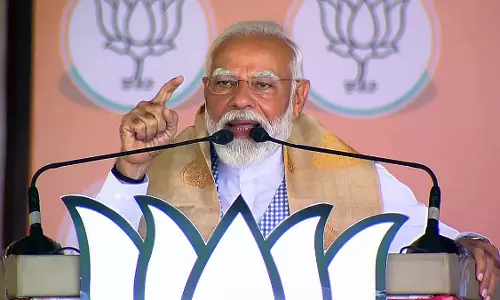
The Brexit Imbroglio
text_fieldsThe most recent developments regarding Brexit are too complicated to be dealt with in a column like this. Brexit is the nick name for Britain's exit from European Union – 28 countries bound by a political and economic pact.
Since 1978, Britain has been its member. More than as a mere political alliance that enables free movement of citizens and goods and services across member countries, EU is also an extensive and stable international alliance – also with 19 of member countries using the common curency of Euro. Europe having been for long a breeding ground of narrow nationalism, the formation of EU can be seen as a correction of its course after suffering severely from the nationalistic malaise. The union also integrates into it several noble concepts of internationalism. With visa-free travel becoming possible and erasing national borders, the EU has shown some models for the world. The issue of not admitting Turkey apart - arguably for the sole reason that it is a Muslim-majority country - from a political perspective EU has to be viewed as a progressive movement.
Britain was a major constituent of EU. But for long there had been a campaign in the country that Britain should quit EU. This campaign was spearheaded by far-right forces. Like other right-wing groups elsewhere in the world, they too were proponents of frenzied nationalism and anti-immigrant. In the vanguard of this campain was the party UKIP (United Kingdom Independent Party) formed in 1993. Since 2000, through different elections, UKIP kept increasing their vote share, which alarmed both the Conservative and Labour parties. It was in this context that in 2013 the then Prime Minister David Cameron put forward the idea of a referendum to decide whether Britain should continue in EU or not. Thus on 23 June 2016, the referendum was held with a Yes or No vote on leave or remain. 52 % voters went in favour of leaving. Accordingly, on 29 March 2019 11 p.m. Britain will have to quit EU.
The Brexit withdrawal agreement is the document that explains the complicated procedures for the process of leaving. If the deal is accepted, there would not be any significant changes to the current status until 31 December 2020. And the preparations for the transition period could have been made in the interim period. However, the Brexit deal was rejected by the British parlilament on 15 January, with a majority of 432 against 202. The critics of the deal argue that the deal sacrifices Britain's self-respect before the EU. And there were even members of Theresa May's own party who voted against the bill. Although the bill was rejected by the parliament, she was able to narrowly survive the no-confidence motion tabled by the Opposition, closely following the Brexit deal defeat. But more complex days are in wait for her.
A new bill has to be moved and parliamentary approval obtained before 21 January 2019, or else Britain will have to exit EU on 29 March 2019 without any deal (No deal exit). The ramifications of a whole edifice of mechanisms in place for decades going in tatters, will be severe. That is bound to greatly affect not only Britain but also the EU and the world's economy. Neither Britain nor EU may now claim to have the resilience to suffer such an impact. There is a legal wayout for holding another referendum and thereby to revisit the very idea of Brexit. For that, a fresh referendum law has to be passed. It is not certain whether that can be held fulfilling all procedural requirements before 29 March. Nor is it clear whether on 21 January the government can come up with a new deal acceptable to EU as also to Britain's political parties. Some of the new alternative suggestions floated amidst this knotty situation are to form a citizen council consisting of prominent leaders of the country and move things according their suggestions, or form a back benchers' council and hear their opinion.
In any case, both Britan and EU are going through a highly complicated crisis. Following Brexit, righ-wing groups in France and Germany have also entered the scene with similar exist campaigns. And dthat is evolving into a large movement against European internationalism. The apprehesion whether Europe is walking back to narrow nationalism is not out of place. If there is no intervention with ample prudence, things will move to a situation with far-reaching consequences.

















